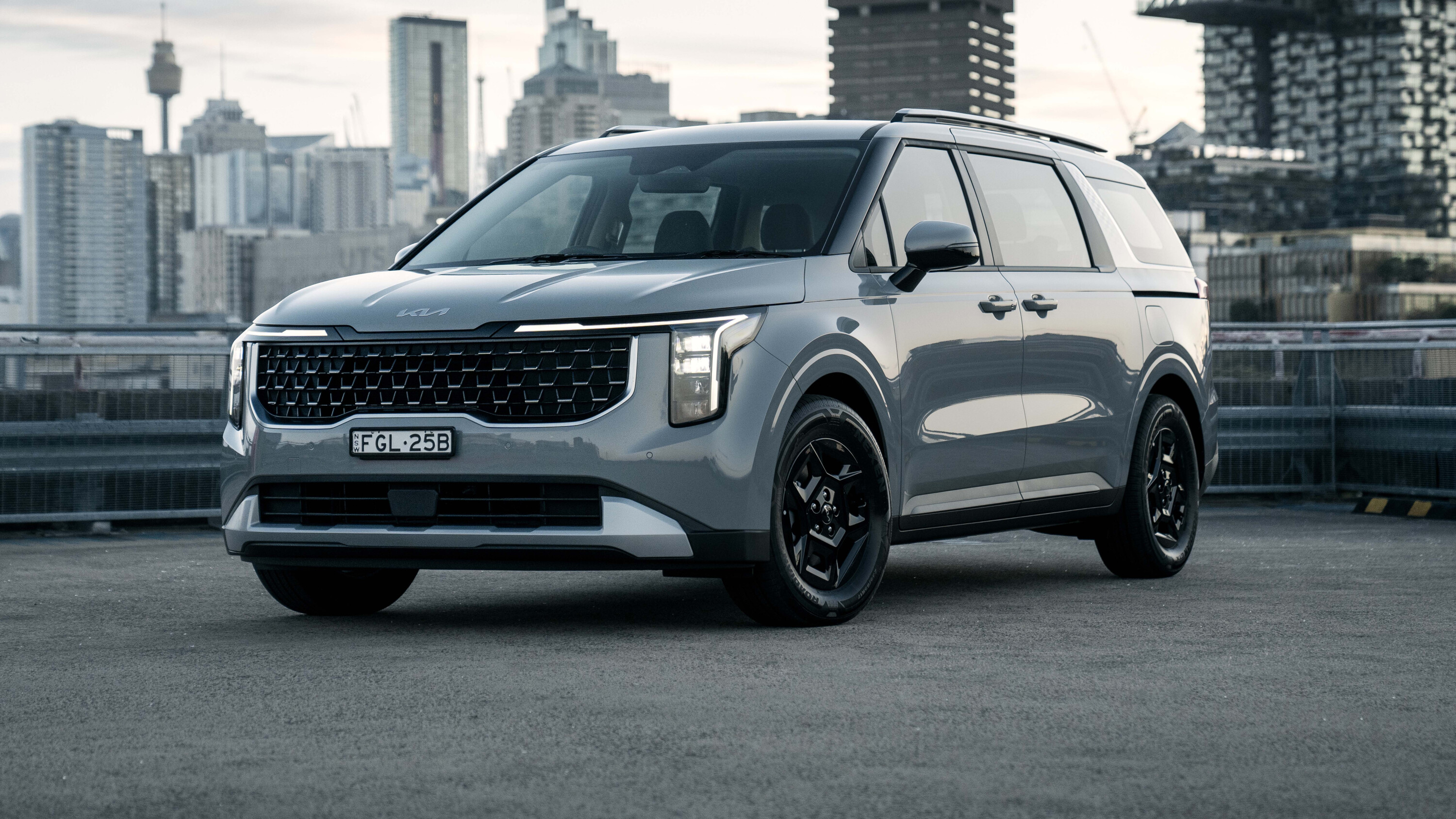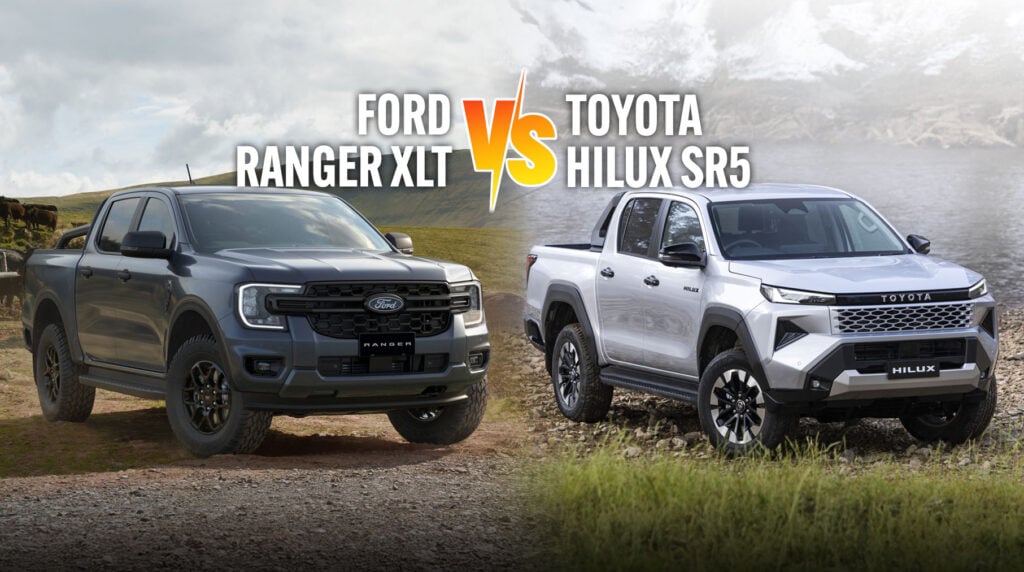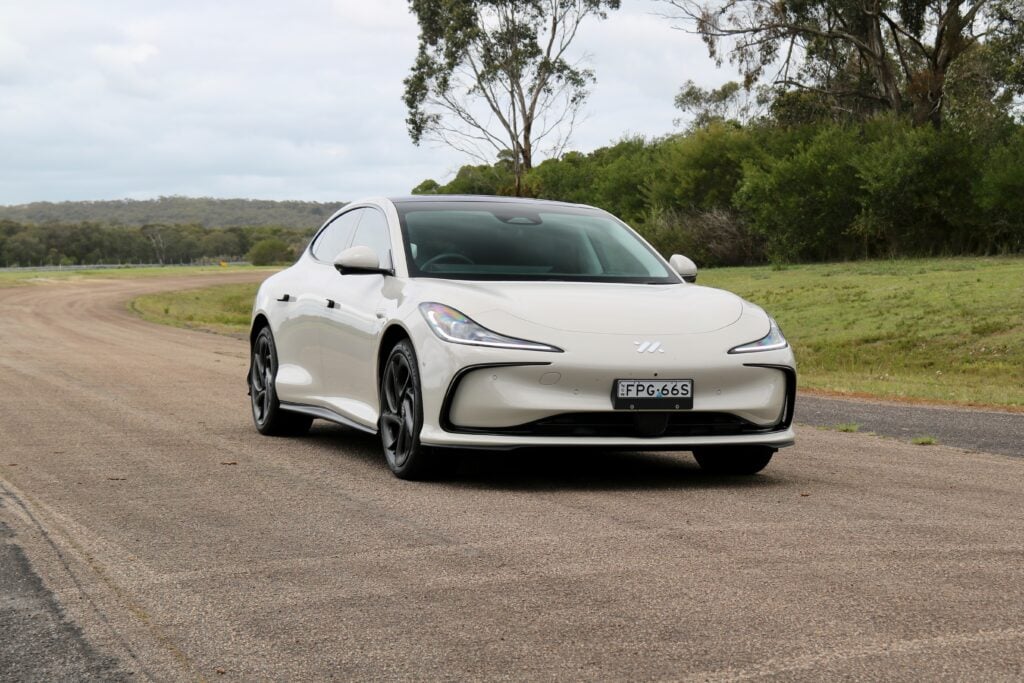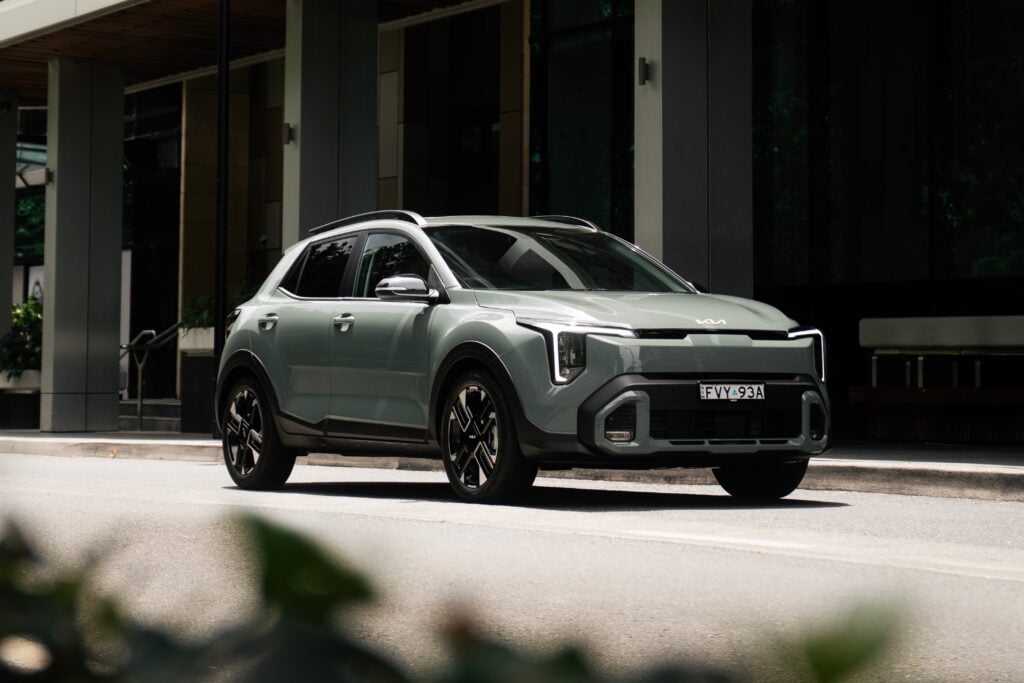Things we like
- Surprisingly enjoyable handling
- Standard-kit improvements
- Supremely versatile cabin
- Airport-shuttle-worthy boot
Not so much
- Irritating speed limit warning and intrusive lane-keep assist
- Price increases of more than $5000 in some instances
- Hybrid yet to be tested and will start as expensive flagship
One in every five people-movers under $70K sold in Australia is not a Kia Carnival.
The Korean family transporter almost single-handedly drove sales in its segment by 25 per cent last year, again trouncing its (admittedly limited) rivals.
A nearly 40 per cent fall in Carnival deliveries so far in 2024 might have given the likes of the Hyundai Staria and Volkswagen Caddy Maxi (and Multivan) a glimmer of hope, but this was merely Kia managing stock levels in preparation for the vehicle you see here – the facelifted 2025 Carnival.
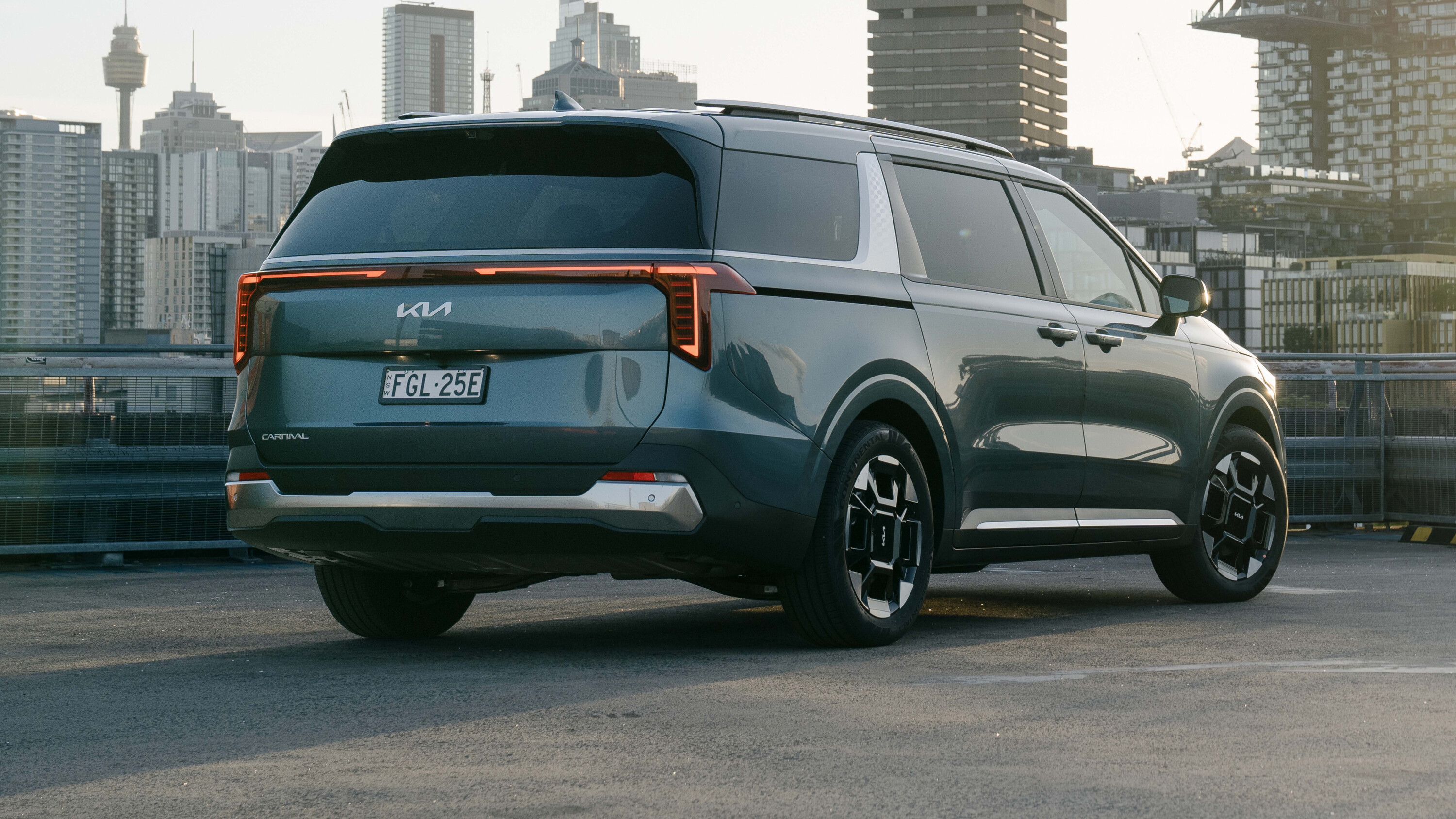
Commendably avoiding an air of complacency that could almost be forgiven such is the model’s market dominance, Kia’s updated Carnival eight-seater brings revisions to several areas, including styling, technology, and powertrains.
The frontal design adopts vertical headlights, ‘Star map’ LED running lights, and a wider grille to give it greater visual commonality with its two large SUV siblings, the electric EV9 and combustion-engined Sorento. New wheel designs also include a nod to the futuristic rims found on the EV9.
At the rear, there’s a cleaner look contrived by a full-width LED strip and a tailgate release that’s now concealed.
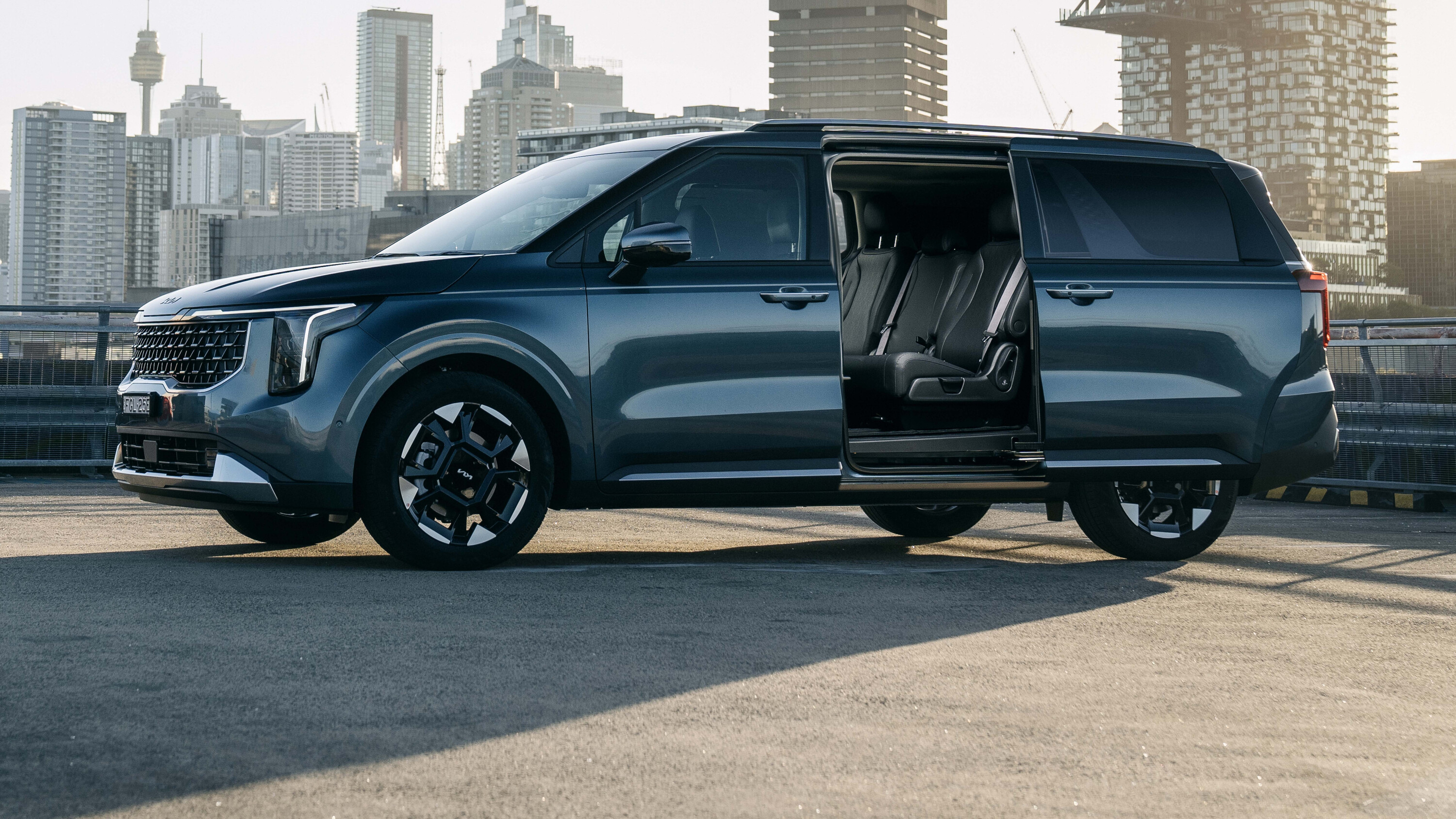
If there’s a ‘Hold the front page’ headline feature of the 2025 Carnival, it must be the first hybrid powertrain to be offered.
Sadly, the petrol-electric Carnival is slightly delayed (due late June at this stage), so our testing was kept to the carryover V6 petrol and four-cylinder diesel engines.
The diesel accounts for 90 per cent of the Carniva’s powertrain mix and its dominance isn’t expected to change dramatically, at least not before the availability of hybrids extends to offer cheaper alternatives.
Initially, petrol-electric power will be exclusive to the GT-Line Hybrid which becomes the most expensive Carnival to date, priced from $76,210 before on-road costs.
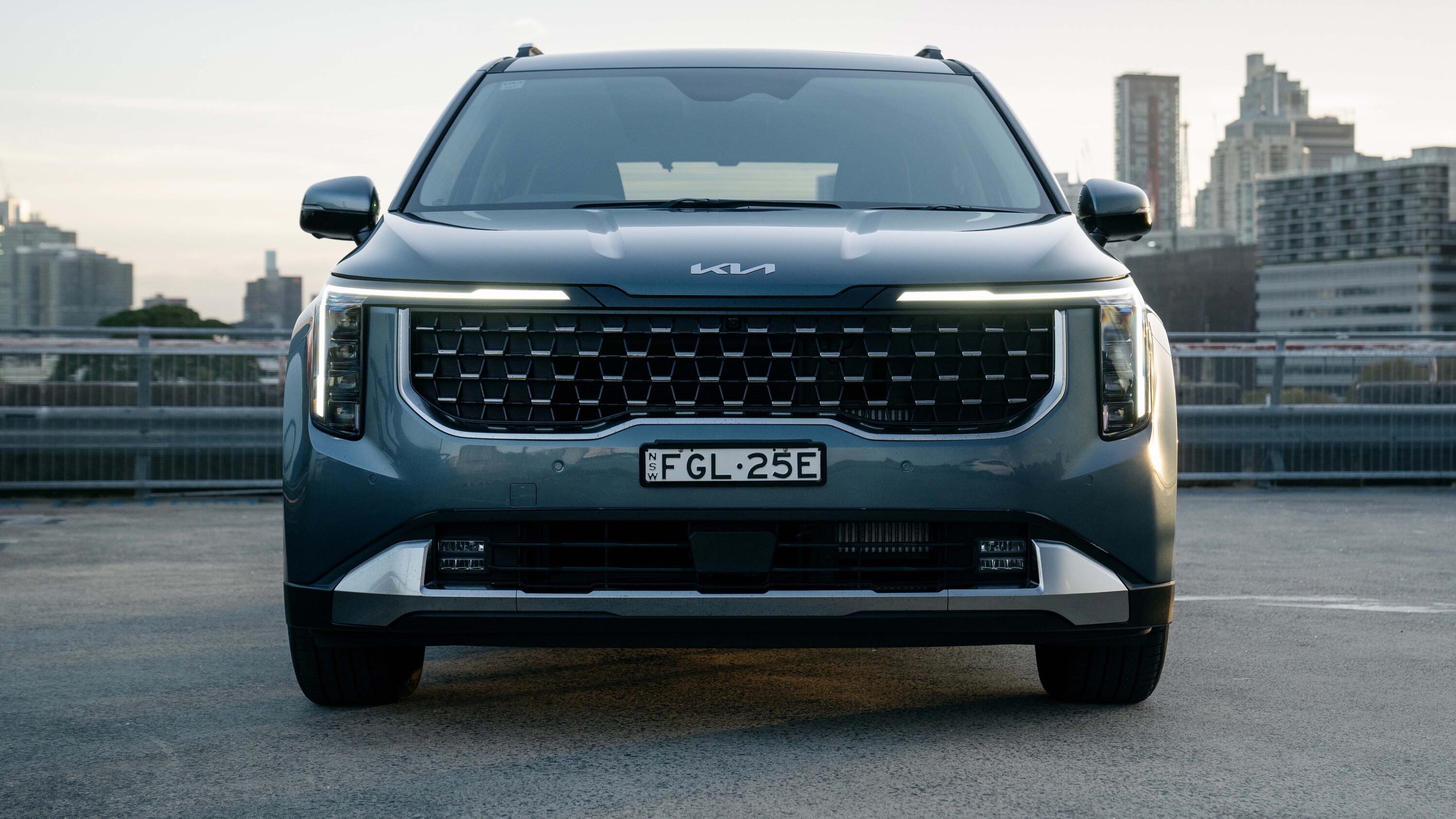
JUMP AHEAD
Pricing and Features
There are multiple Carnival options below that range-topping hybrid, starting from a far more attainable $50,150 (excluding on-road costs) – though pricing has increased across the range by as much as $5390.
Naming for each trim grade now aligns with other Kia models, changing from S/Si/SLi/SE/Platinum to S, Sport, Sport+, GT-Line Lite (a rebranded Special Edition), and GT-Line.
Each grade is available with either V6 petrol power or, for a $2230 premium, diesel grunt. (The GT-Line, as mentioned earlier, will also be available with the hybrid option.)
For a more detailed guide to the 2025 Kia Carnival’s pricing and features, click on the feature link below.
The Interior
Technology is the primary upgrade for the latest Carnival.
Every model now joins the list of Kias featuring a curved (or rather kinked) dual digital display, though S and Sport models have a smaller and more simplistic instrument display whereas Sport+, GT-Line Lite and GT-Line grades have a more expansive and more sophisticated 12.3-inch cluster.
All models have a 12.3-inch infotainment touchscreen, now also benefiting from over-the-air updates and a ‘Streaming Plus’ entertainment service, while there’s a complimentary seven-year Kia Connect telematics service.
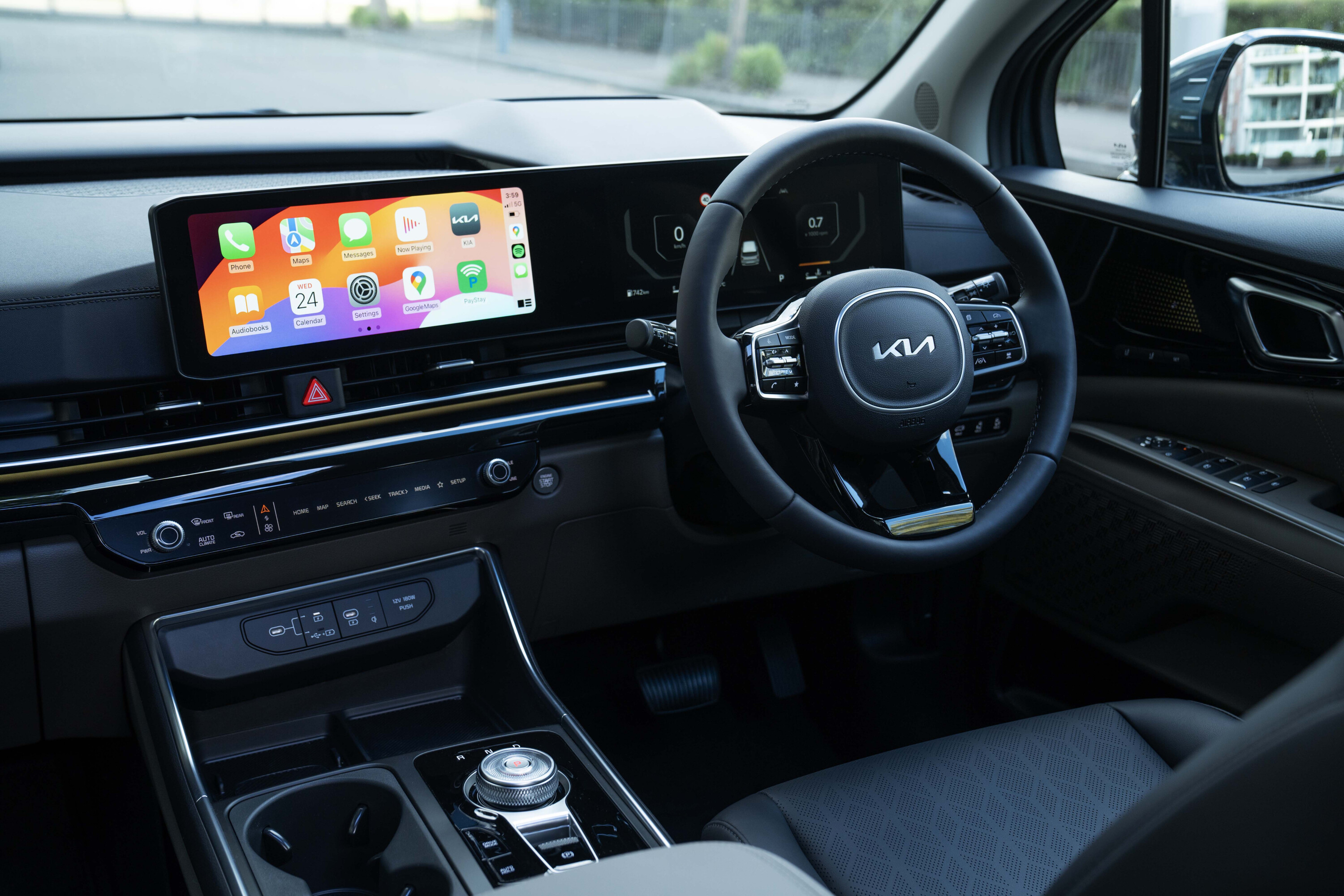
The clever, switchable climate/audio touch panel from the likes of the EV6 and Sportage completes the revised dash layout.
Kia’s ‘ccNC’ infotainment system is plenty intuitive, fast-responding, and on the money graphically. Just note the ‘Full’ version isn’t available on the base S, meaning it omits built-in nav. The option to switch to Apple CarPlay or Android Auto is on all models, though.
Wireless phone charging is now available on more than just the flagship Carnival, with only the base S now missing out.
No changes to the 2-3-3 seating layout, which continues to be a marvel of interior space, storage, and comfort.
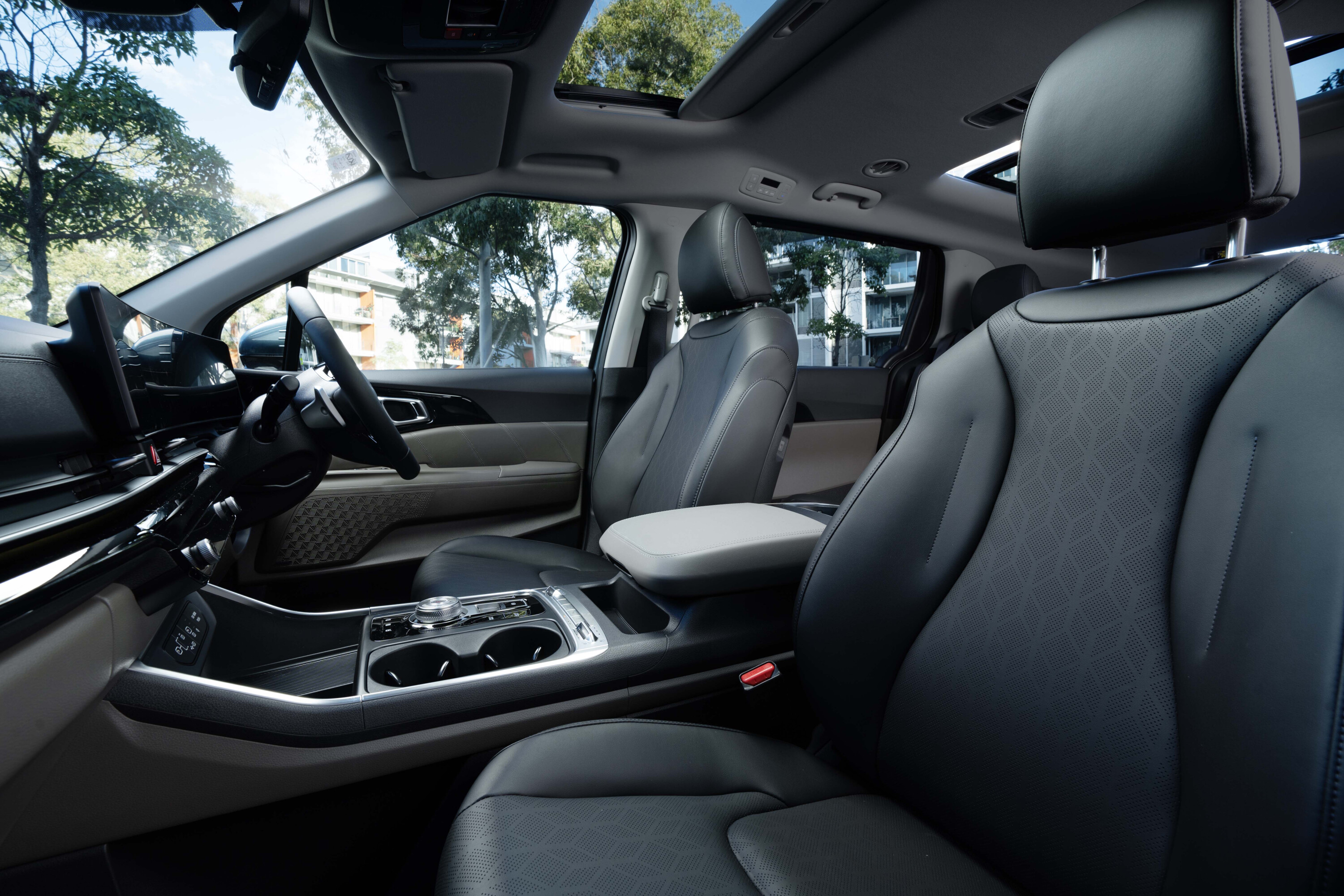
Three adults can sit across both the second and third rows with sufficient comfort, with abundant legroom in the second row and more in the last row than you’ll find in your average seven-seater SUV.
All Carnival variants offer parents the wonderful flexibility of putting younger kids in the rearmost seats thanks to ISOFIX points and top-tether anchors for the outboard positions.
The amount of convenience then simply comes down to the grade you choose. Sport+ and above, for example, come with electric sliding rear doors (that kids also love to use).
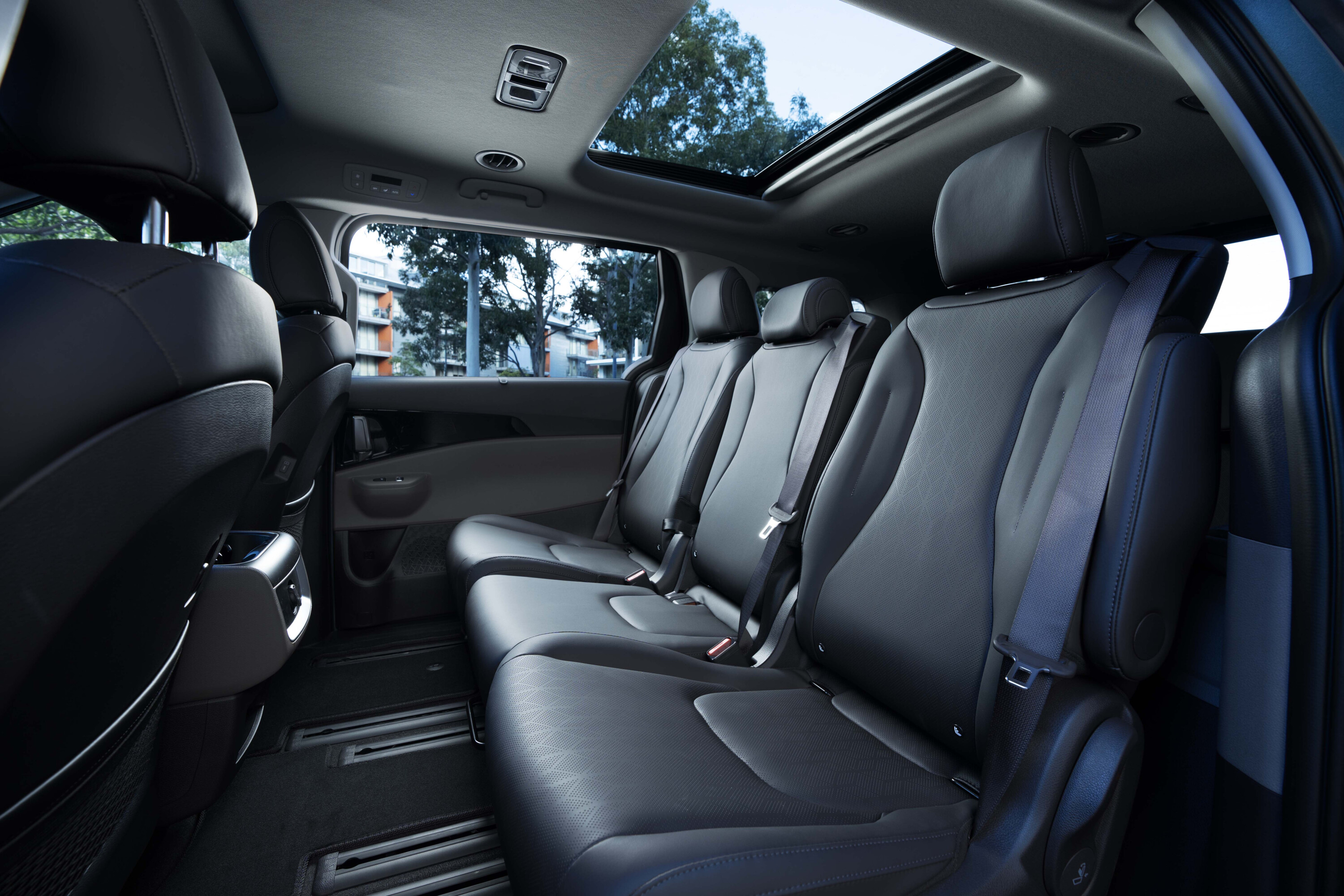
Boot space
The Kia’s brilliantly deep boot provides a quoted capacity of 627 litres when the rear seats are in play. You won’t find many multi-seater large SUVs capable of swallowing as much luggage while seating seven (or more) occupants.
Push-fold the third-row seats (divided into a 50:50 arrangement) to create a cavernous volume of 2827 litres.
A spare wheel remains stowed under the vehicle floor, around halfway along and on the driver’s side.
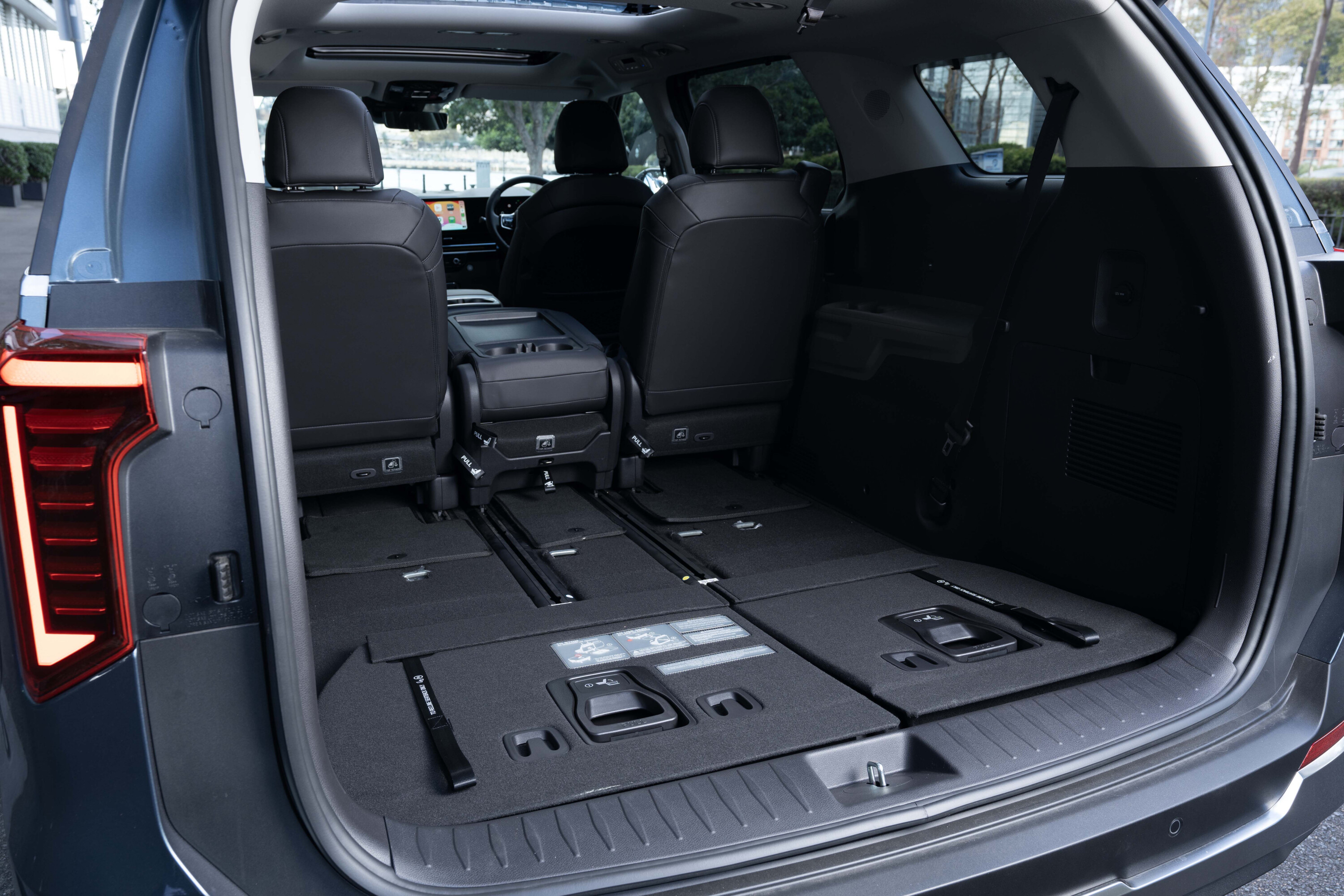
On the road
While it’s a shame we’re not able to test the hybrid Carnival, the non-electrified carry-over combustion options remain likeable and appealing for different reasons.
The V6 petrol lacks low-down torque but revs sweetly and is quieter than the four-cylinder turbo-diesel, even if the latter’s traditional clatter is far from offensively noisy.
Chunky torque (440Nm) and lower fuel consumption (6.5L/100km v 9.6L/100km) are undoubtedly what draw the vast majority of Carnival buyers to the diesel.
It will be interesting to see how the powertrain mix evolves once there are more hybrid variants offered. The turbo-petrol/electric motor combination has decent outputs on paper – 183kW/367Nm – and, with official consumption of 5.8L/100km, undercuts the existing engines for efficiency.
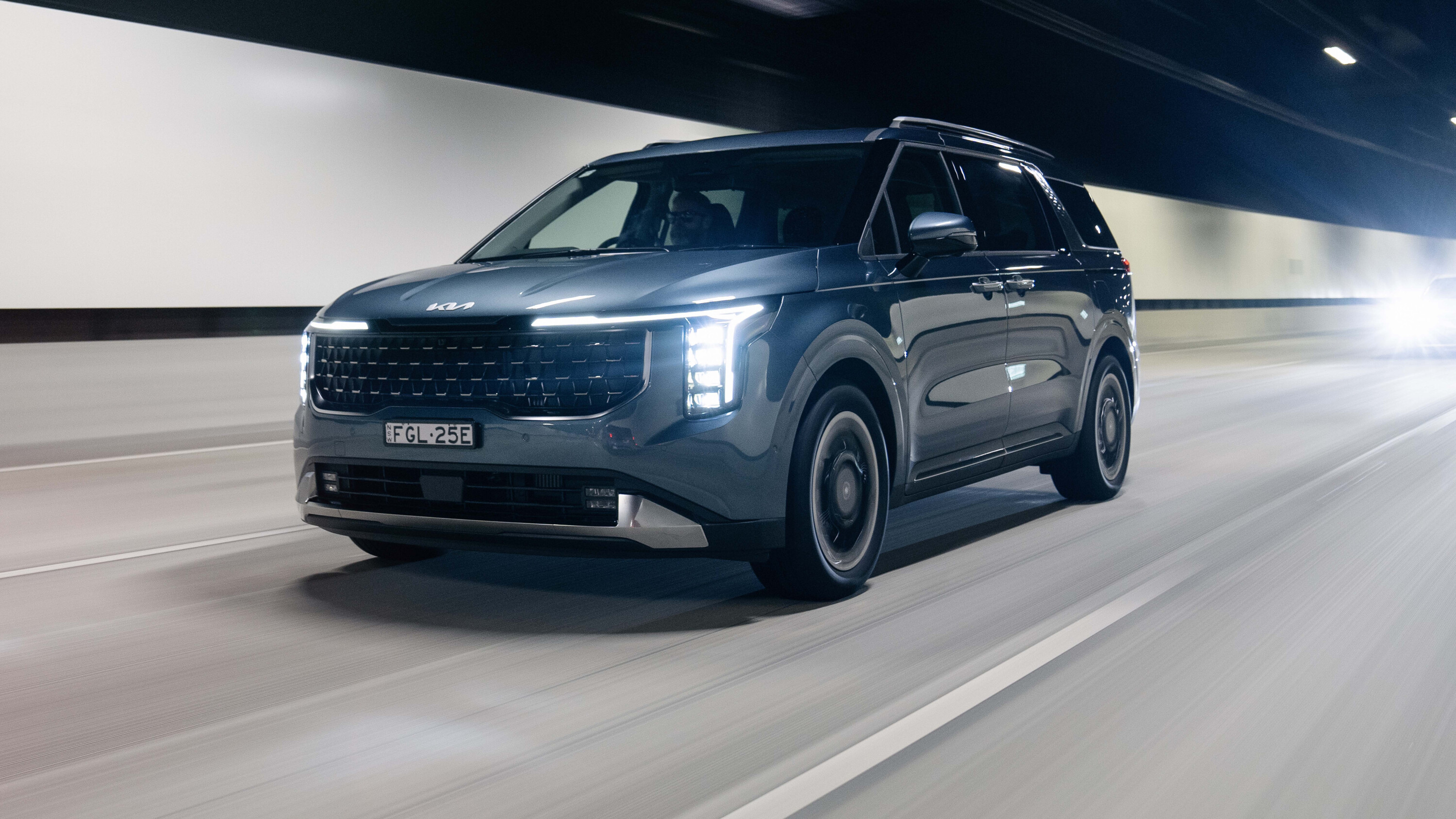
Hybrid Carnivals will make do with a six-speed auto where the petrol and diesel motors pair with an eight-speed auto that continues to impress with its ability to pick gears decisively and in a timely manner.
There wasn’t a great deal wrong with the way the Carnival previously drove, yet Kia Australia’s local chassis tuning team says it focused on further improving the people-mover’s dynamics on country roads, with particular attention paid to reducing pitch and improving cabin isolation on rougher surfaces.
Suspension tweaks include the introduction of faster-rate Nando dampers and stiffened front springs. There’s also a full recalibration for the power steering.
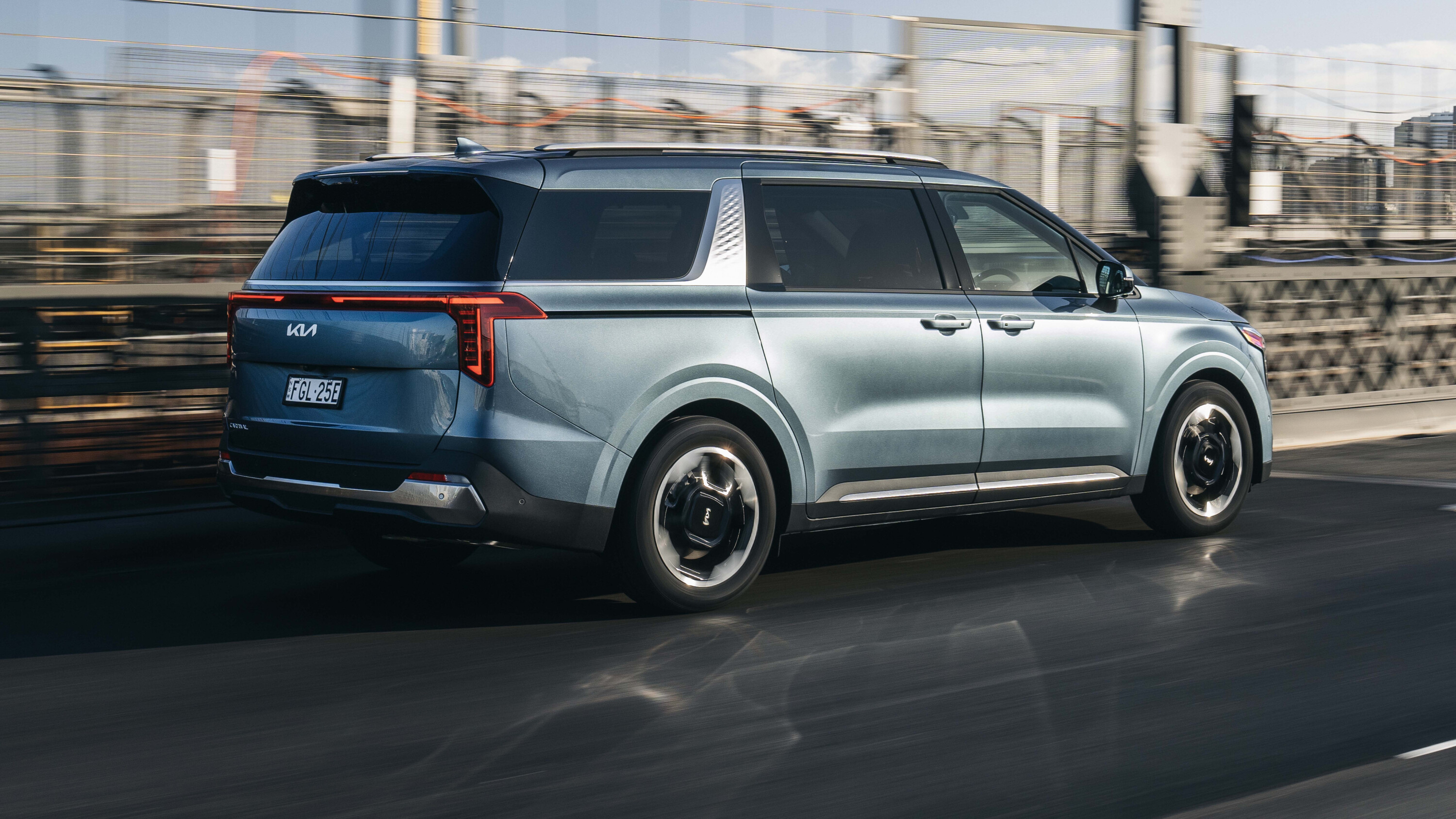
I must admit I noticed the steering change less than I did the Carnival’s step-change body control, its long, 5.3-metre body now remaining flatter through corners and under braking – transitioning from what had been a competent-handling people-mover to being one that is genuinely enjoyable to steer.
While there’s a caveat that our first test car of the day was the lightest (and smallest-wheeled) Carnival, it’s not often that we’ll consciously choose to do an extra ride-handling loop in a people-mover. It was a challenging course, too, just north of Sydney and popular with not only the Hyundai and Kia local testing teams but also the WhichCar test team.
The 2025 Carnival’s handling is reminiscent of the Honda Odyssey, a driver’s people-mover before it was ruined by a terrible ride with the last generation.
If there are any downsides to the suspension changes, there’s perhaps been a slight reduction in the Carnival’s low-speed bump absorption, but it generally remains a comfortable ride – at its best, naturally, on the 17s of the base S.

The 19s of a GT-Line Lite diesel we also drove made for a slightly fussier ride.
Our biggest disappointment in terms of driving experience, however, is Kia’s incessantly annoying warning chimes and beeps, especially the speed limit notification that ‘chastises’ the driver every time they stray slightly over a posted speed limit. It’s compounded by a road-sign-spotting camera that sometimes misses a change of limit or can’t recognise when a school zone is out of hours.
The lane-keep system also remains too sensitive, trying to correct the steering even when the Carnival is well clear of any lane markings.
It is simple enough to turn off the latter via a button on the steering wheel, but switching off the speed limit warning requires delving into the central touchscreen. Both are default settings, however, so the process must be repeated every time you start the vehicle.
If any of the terms in this section have left you scratching your head, these articles will help bring you up to speed!
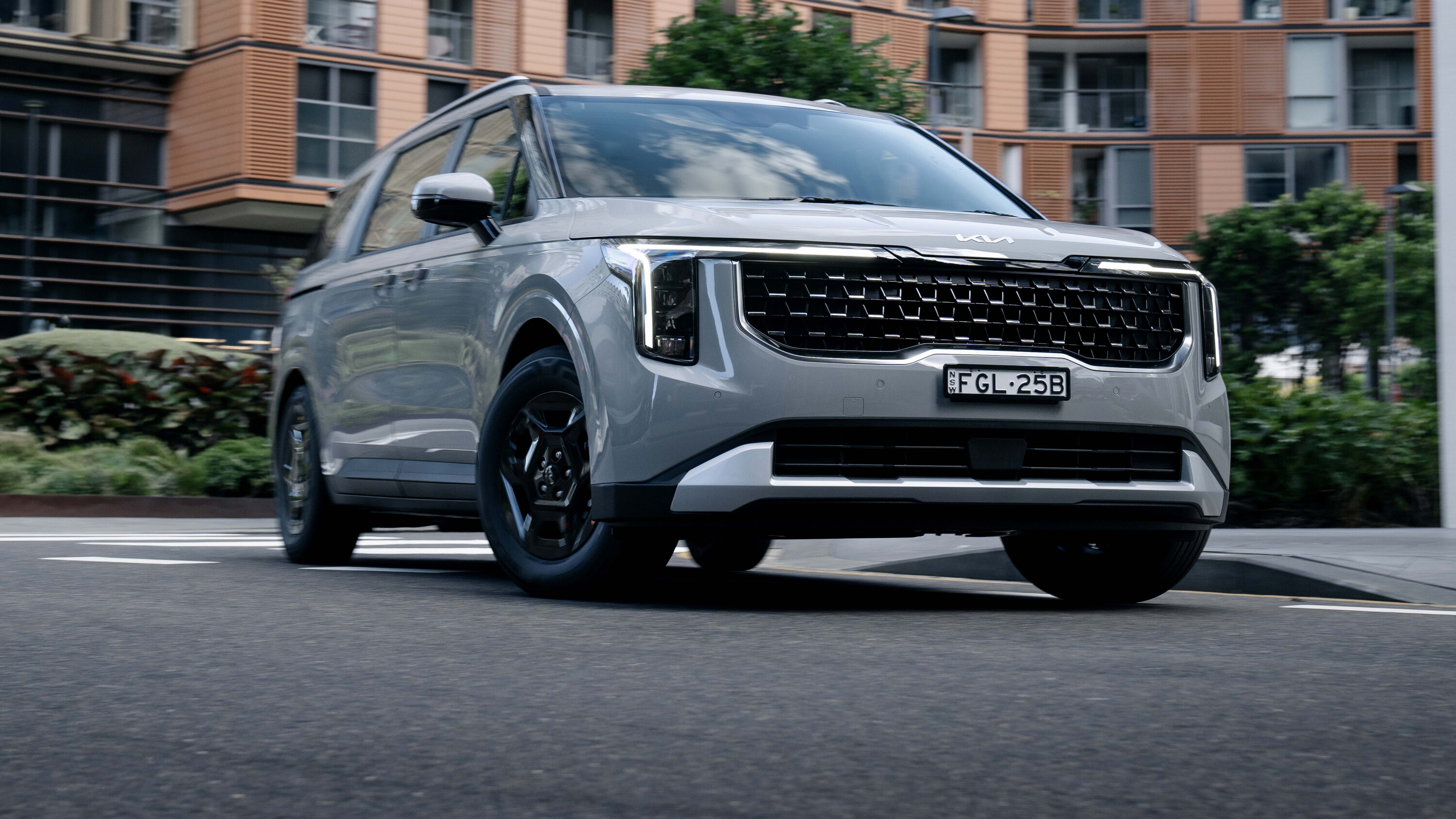
- What is a Powertrain or Drivetrain?
- Power vs torque
- Car suspension explained
- Automatic transmissions (‘gearboxes’) explained
- Chassis control systems explained
- Car vs Ute vs SUV: How the vehicle you buy should guide the way you drive
- What is the WLTP emissions and range test?
The Carnival’s airbag count expands with the addition of a front-centre airbag to match the Staria.
And as with the Hyundai, curtain airbags fully extend to the third row – unlike Kia’s seven-seater large SUV, the Sorento, which covers the third-row glass only.
Safe exit warning and assist are standard, which not only flash if the rear doors are about to open with traffic approaching but auto-lock them, too.
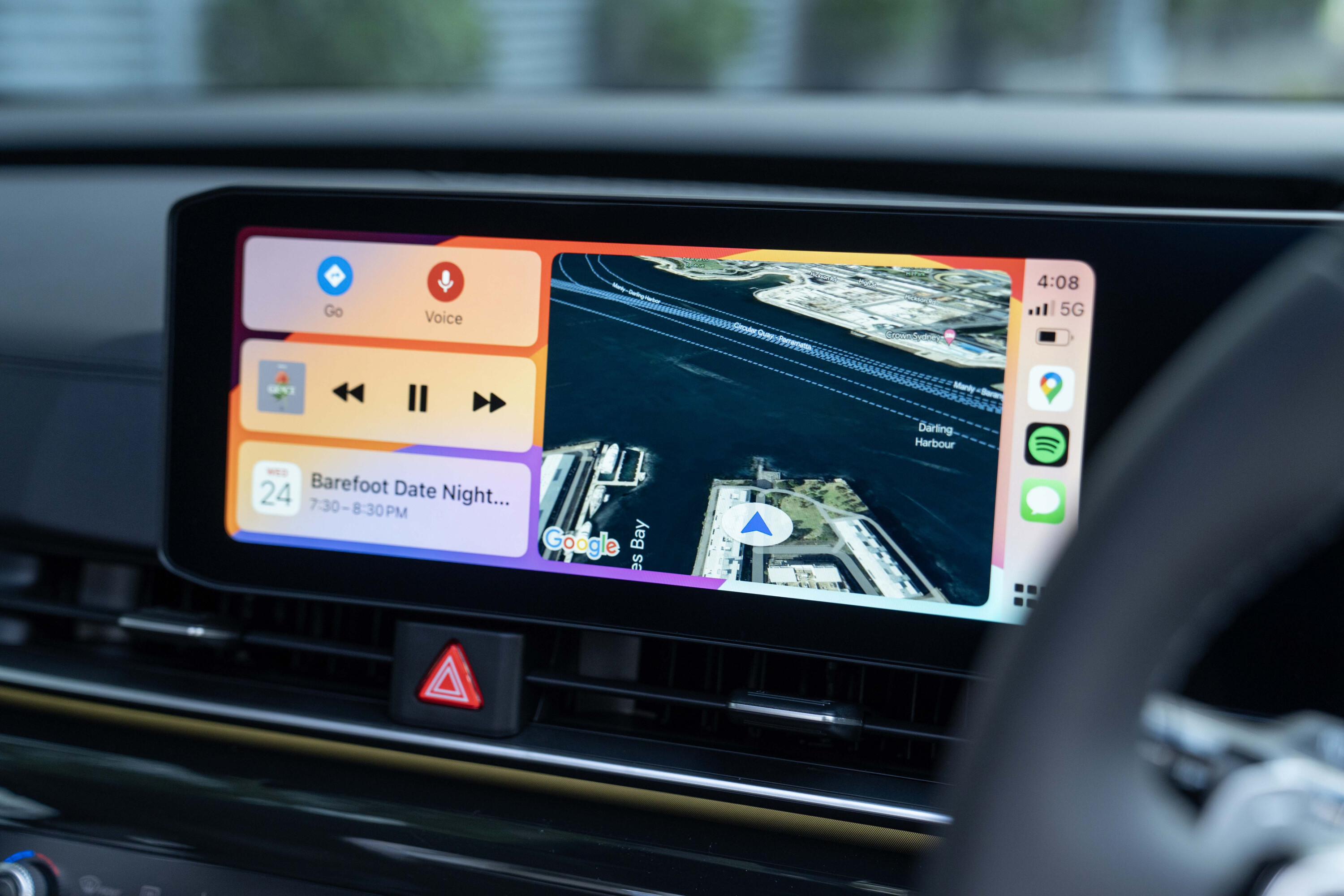
Adaptive cruise control with stop-and-go functionality is standard from the base model, with a lane-following steering feature on Sport and above. Sport Plus grade and higher add lane-change assistance.
Flagship GT-Line models bring a head-up display, digital rear-view mirror, and key-fob-controlled out-of-vehicle parking for tight spaces.
The Carnival has a five-star maximum crash rating from ANCAP, tested in 2021 and with strong scores for both adult and child occupants.
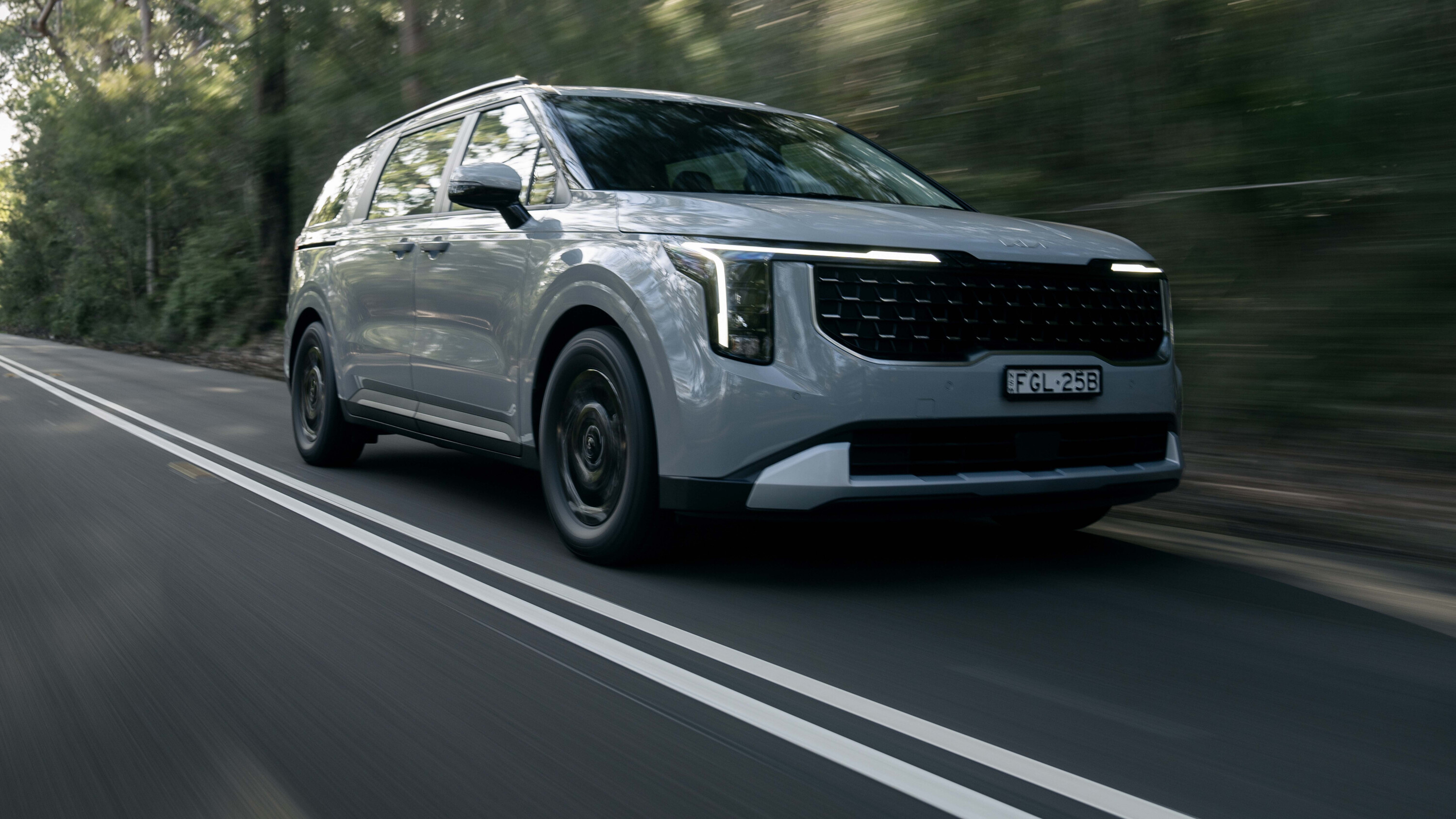
VERDICT
Frustratingly persistent yet unwarranted driver ‘aids’ take some of the gloss away – and indeed marks – from the 2025 Carnival.
Yet you still don’t need to spend long in this people-mover to understand its immense popularity.
That it now looks more contemporary with its styling revisions and tech-enhanced dash and is even more appealing for keen motorists, brings added bonuses.
We just won’t know the absolute best version to buy until the hybrid arrives.
| 2024 Kia Carnival specifications | 3.5-litre petrol | 2.2-litre diesel | 1.6-litre petrol hybrid |
|---|---|---|---|
| Engine | V6 DOHC GDi | In-line 4-cylinder, 16 valve CRDI | 4-cylinder petrol-electric hybrid |
| Capacity | 3.5 litres | 2.2 litres | 1.6 litres |
| Max power | 216kW | 148kW | 183kW |
| Max torque | 355Nm | 440Nm | 367Nm |
| Transmission | 8-speed automatic | 6-speed automatic | |
| Length | 5155mm | ||
| Width | 1995mm | ||
| Height (with roofrails) | 1775mm | ||
| Wheelbase | 3090mm | ||
| Ground clearance | 162mm | ||
| Boot (all seats up) | 627 litres | ||
| Boot (3rd row folded) | 2827 litres | ||
| Fuel consumption (combined) | 9.6L/100km | 6.5L/100km | 5.8L/100km |
| Kerb weight | 2206kg | 2245kg | 2253kg |
| Towing capacity (braked) | 2000kg | 1134kg | |
| Front brakes | 325mm ventilated disc | ||
| Rear brakes | 325mm solid disc | ||
| Front suspension | McPherson Strut | ||
| Rear suspension | Multi-link | ||
| Wheel size | 17-inch (base) | ||
| Tyres | 235/65 R17 | ||
| Price (before on-road costs) | $50,150 | $52,380 | $76,210 |
Things we like
- Surprisingly enjoyable handling
- Standard-kit improvements
- Supremely versatile cabin
- Airport-shuttle-worthy boot
Not so much
- Irritating speed limit warning and intrusive lane-keep assist
- Price increases of more than $5000 in some instances
- Hybrid yet to be tested and will start as expensive flagship
We recommend
-
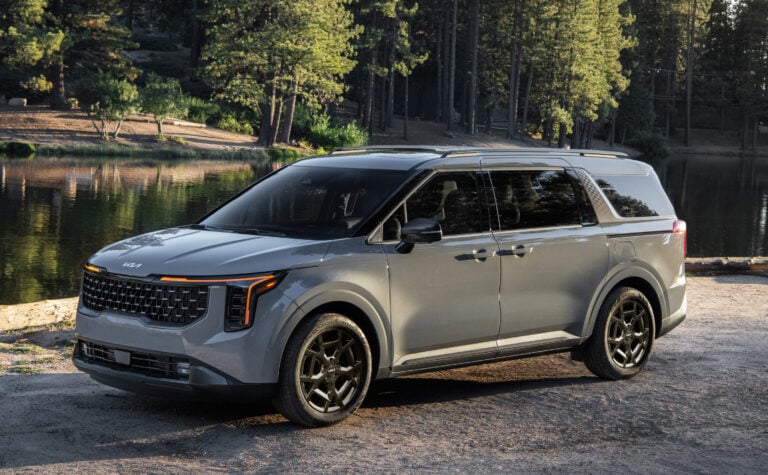 News
News2025 Kia Carnival facelift pricing and features: car-based people mover detailed, up to $5390 dearer
The facelifted Kia Carnival people is now in Australian showrooms priced between $2670 and $5390 dearer than before
-
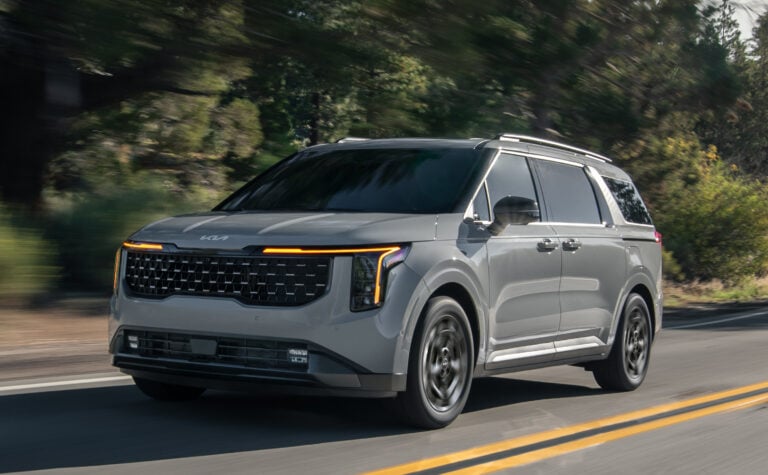 News
News2024 Kia Carnival Hybrid one step closer to Australia
The Kia Carnival Hybrid people mover has been approved for sale in Australia ahead of its launch later this year
-
 News
NewsNew car calendar 2026: All the new cars coming to Australia next year
Here’s the WhichCar by Wheels guide to all the new cars that will launch in Australia in 2026. Check back in regularly for updates...


